英法百年战争英文PPT
- 格式:ppt
- 大小:3.04 MB
- 文档页数:15
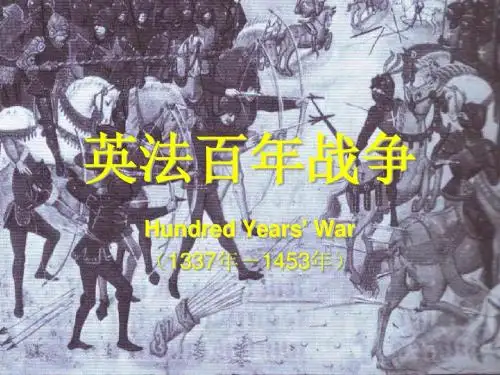
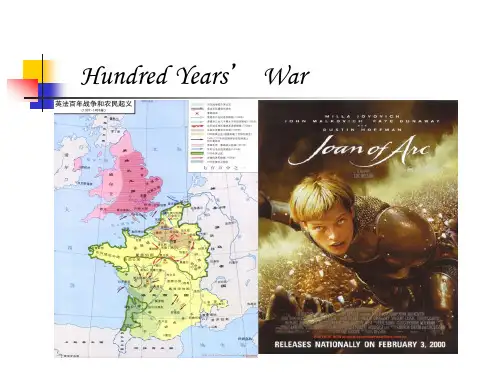

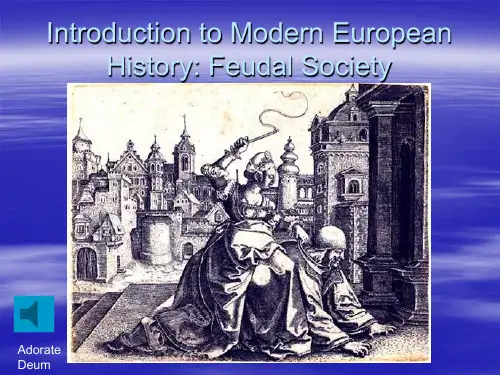
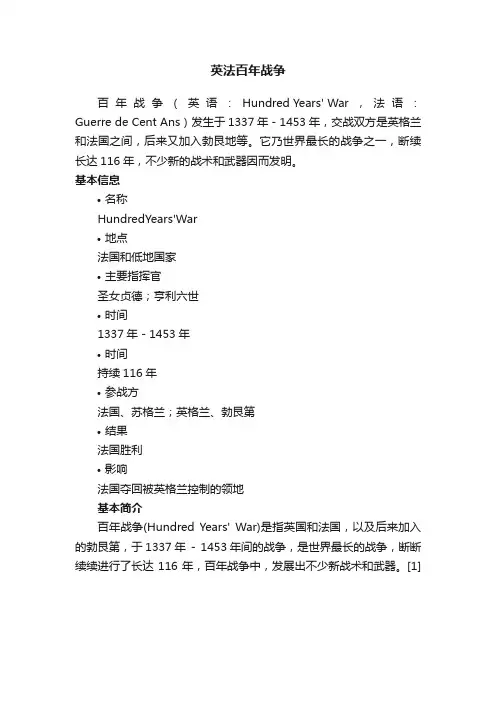
英法百年战争百年战争(英语:Hundred Years' War,法语:Guerre de Cent Ans)发生于1337年-1453年,交战双方是英格兰和法国之间,后来又加入勃艮地等。
它乃世界最长的战争之一,断续长达116年,不少新的战术和武器因而发明。
基本信息•名称HundredYears'War•地点法国和低地国家•主要指挥官圣女贞德;亨利六世•时间1337年-1453年•时间持续116年•参战方法国、苏格兰;英格兰、勃艮第•结果法国胜利•影响法国夺回被英格兰控制的领地基本简介百年战争(Hundred Years' War)是指英国和法国,以及后来加入的勃艮第,于1337年- 1453年间的战争,是世界最长的战争,断断续续进行了长达116年,百年战争中,发展出不少新战术和武器。
[1]12世纪中,英国金雀花王朝在法国占有广阔领地,12~13世纪,法国国王逐渐夺回部分被英王占领的土地。
14世纪初,英国仍占据法国南部阿基坦地区,成为法国政治统一的最大障碍。
双方还争夺富庶的佛兰德地区。
佛兰德毛纺业主要依赖英国的原料,英国则从羊毛贸易中获取巨利。
1328年,法国占领佛兰德,英王爱德华三世(1327~1377在位)下令禁止羊毛出口。
佛兰德因失去原料来源,转而支持英国的百年战争中战场上的法军反法政策。
战争的导火线主要是王位继承问题。
1328年,查理四世去世,法国卡佩王朝绝嗣,支裔瓦卢瓦王朝的腓力六世继位,英王爱德华三世以法王查理四世外甥的资格,与腓力六世争夺王位,触发战争。
1337年11月英王爱德华三世率军进攻法国,战争开始。
1340年,英法两国发生海战,法军战败。
英国控制了英吉利海峡。
1346 年8月,双方在克雷西会战,英军大捷,乘胜进入诺曼底。
1347年攻占法国的加来。
1356年9 月,普瓦提埃之战,法军大败,法王约翰二世(1350~1364在位)及众臣被俘,英借此向法国索取巨额赎金。
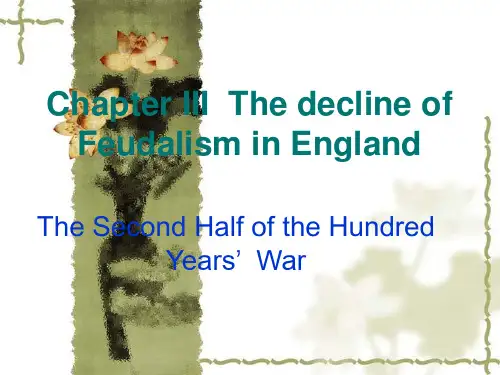
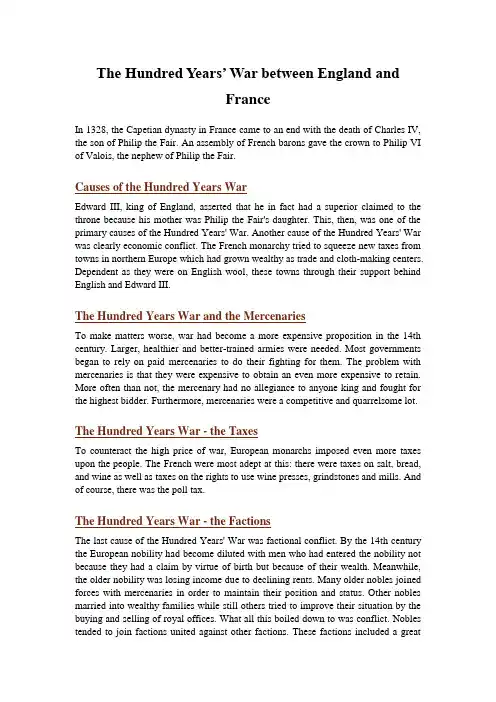
The Hundred Years’ War between England andFranceIn 1328, the Capetian dynasty in France came to an end with the death of Charles IV, the son of Philip the Fair. An assembly of French barons gave the crown to Philip VI of Valois, the nephew of Philip the Fair.Causes of the Hundred Years WarEdward III, king of England, asserted that he in fact had a superior claimed to the throne because his mother was Philip the Fair's daughter. This, then, was one of the primary causes of the Hundred Years' War. Another cause of the Hundred Years' War was clearly economic conflict. The French monarchy tried to squeeze new taxes from towns in northern Europe which had grown wealthy as trade and cloth-making centers. Dependent as they were on English wool, these towns through their support behind English and Edward III.The Hundred Years War and the MercenariesTo make matters worse, war had become a more expensive proposition in the 14th century. Larger, healthier and better-trained armies were needed. Most governments began to rely on paid mercenaries to do their fighting for them. The problem with mercenaries is that they were expensive to obtain an even more expensive to retain. More often than not, the mercenary had no allegiance to anyone king and fought for the highest bidder. Furthermore, mercenaries were a competitive and quarrelsome lot. The Hundred Years War - the TaxesTo counteract the high price of war, European monarchs imposed even more taxes upon the people. The French were most adept at this: there were taxes on salt, bread, and wine as well as taxes on the rights to use wine presses, grindstones and mills. And of course, there was the poll tax.The Hundred Years War - the FactionsThe last cause of the Hundred Years' War was factional conflict. By the 14th century the European nobility had become diluted with men who had entered the nobility not because they had a claim by virtue of birth but because of their wealth. Meanwhile, the older nobility was losing income due to declining rents. Many older nobles joined forces with mercenaries in order to maintain their position and status. Other nobles married into wealthy families while still others tried to improve their situation by the buying and selling of royal offices. What all this boiled down to was conflict. Nobles tended to join factions united against other factions. These factions included a greatfamily, their knights, servants and even workers and peasants on the manorial estate. They had their own small armies, loyalties and even symbols of allegiance. The bottom line is that these factions were beginning to form small states within a state and contributed not only to the overall violence of the 14th century but also to the need of monarchs to keep their nobility under constant surveillance. This explains why Louis XIV, the Sun King, housed his nobility at Versailles -- it was so he could keep an eye on them.The Hundred Years War - AquitaineThe most pressing issue during the Hundred Years' War was the status of Aquitaine, a large province in south western France. According to feudal law, Edward III held Aquitaine as part of his fiefdom. Philip attacked this territory, claiming it was rightfully his. Edward's response was to join forces with the Flemish in 1337 and this was the principal cause of the war.The Hundred Years WarThe war, fought entirely on French soil, raged off and on for more than 100 years. English victories were followed by French victories, then a period of stalemate would ensue, until the conflicts again rose to the surface. During periods of truce, English and French soldiers -- most of whom were mercenaries -- would roam the French countryside killing and stealing. After the battle of Agincourt in 1415, won by the English under Henry V, the English controlled most of northern France. It appeared that England would shortly conquer France and unite the two countries under one crown. At this crucial moment in French history, a young and illiterate peasant girl, Joan of Arc (c.1412-1431), helped to rescue France.The One Hundred Years War and Joan of ArcAt the age of 13 Joan believed she had heard the voices of St. Michael, St. Catherine and St. Margaret bidding her to rescue the French people. Believing that God had commanded her to drive the English out of France, Joan rallied the demoralized French troops, leading them in battle. Clad in a suit of white armor and flying her own standard she liberated France from the English at the battle of Orleans. Ultimately captured and imprisoned by the English, Joan of Arc was condemned as a heretic and a witch and stood trial before the Inquisition in 1431. Joan was found guilty and was to be burnt at the stake but at the last moment she broke down and recanted everything. She eventually broke down again and faithful to her "voices," decided to become a martyr and was then burnt at the stake and became a national hero.。

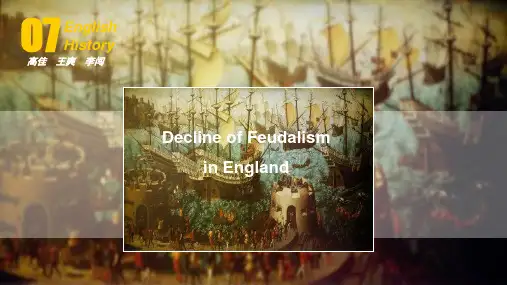
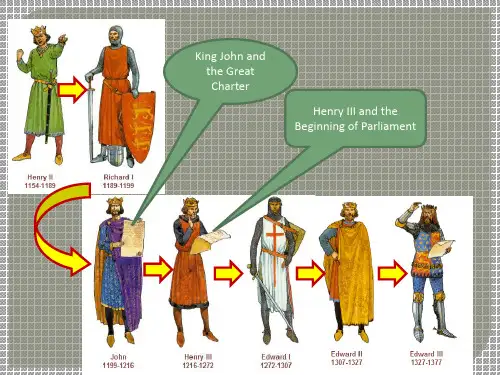

TheHundredYearsWar英法百年战争The Hundred Years’ War between England andFranceIn 1328, the Capetian dynasty in France came to an end with the death of Charles IV, the son of Philip the Fair. An assembly of French barons gave the crown to Philip VI of Valois, the nephew of Philip the Fair.Causes of the Hundred Years WarEdward III, king of England, asserted that he in fact had a superior claimed to the throne because his mother was Philip the Fair's daughter. This, then, was one of the primary causes of the Hundred Years' War. Another cause of the Hundred Years' War was clearly economic conflict. The French monarchy tried to squeeze new taxes from towns in northern Europe which had grown wealthy as trade and cloth-making centers. Dependent as they were on English wool, these towns through their support behind English and Edward III.The Hundred Years War and the MercenariesTo make matters worse, war had become a more expensive proposition in the 14th century. Larger, healthier and better-trained armies were needed. Most governments began to rely on paid mercenaries to do their fighting for them. The problem with mercenaries is that they were expensive to obtain an even more expensive to retain. More often than not, the mercenary had no allegiance to anyone king and fought for the highest bidder. Furthermore, mercenaries were a competitive and quarrelsome lot. The Hundred Years War - the TaxesTo counteract the high price of war, European monarchs imposed even more taxes upon the people. The French weremost adept at this: there were taxes on salt, bread, and wine as well as taxes on the rights to use wine presses, grindstones and mills. And of course, there was the poll tax.The Hundred Years War - the FactionsThe last cause of the Hundred Years' War was factional conflict. By the 14th century the European nobility had become diluted with men who had entered the nobility not because they had a claim by virtue of birth but because of their wealth. Meanwhile, the older nobility was losing income due to declining rents. Many older nobles joined forces with mercenaries in order to maintain their position and status. Other nobles married into wealthy families while still others tried to improve their situation by the buying and selling of royal offices. What all this boiled down to was conflict. Nobles tended to join factions united against other factions. These factions included a great family, their knights, servants and even workers and peasants on the manorial estate. They had their own small armies, loyalties and even symbols of allegiance. The bottom line is that these factions were beginning to form small states within a state and contributed not only to the overall violence of the 14th century but also to the need of monarchs to keep their nobility under constant surveillance. This explains why Louis XIV, the Sun King, housed his nobility at Versailles -- it was so he could keep an eye on them.The Hundred Years War - AquitaineThe most pressing issue during the Hundred Years' War was the status of Aquitaine, a large province in south western France. According to feudal law, Edward III held Aquitaine as part of his fiefdom. Philip attacked this territory, claiming it was rightfully his. Edward's response was to join forces with the Flemish in 1337and this was the principal cause of the war.The Hundred Years WarThe war, fought entirely on French soil, raged off and on for more than 100 years. English victories were followed by French victories, then a period of stalemate would ensue, until the conflicts again rose to the surface. During periods of truce, English and French soldiers -- most of whom were mercenaries -- would roam the French countryside killing and stealing. After the battle of Agincourt in 1415, won by the English under Henry V, the English controlled most of northern France. It appeared that England would shortly conquer France and unite the two countries under one crown. At this crucial moment in French history, a young and illiterate peasant girl, Joan of Arc (c.1412-1431), helped to rescue France.The One Hundred Years War and Joan of ArcAt the age of 13 Joan believed she had heard the voices of St. Michael, St. Catherine and St. Margaret bidding her to rescue the French people. Believing that God had commanded her to drive the English out of France, Joan rallied the demoralized French troops, leading them in battle. Clad in a suit of white armor and flying her own standard she liberated France from the English at the battle of Orleans. Ultimately captured and imprisoned by the English, Joan of Arc was condemned as a heretic and a witch and stood trial before the Inquisition in 1431. Joan was found guilty and was to be burnt at the stake but at the last moment she broke down and recanted everything. She eventually broke down again and faithful to her "voices," decided to become a martyr and was then burnt at the stake and became a national hero.。
百年战争
自1337年到1453年长达100多年之间,英法两国一直持续着一场断断续续的战争,史称百年战争(The Hundred Years' War)。
英法百年战争的直接导火线是法国加佩王朝(Capetienne Dynasty)查理四世1328年死后无男嗣所引起的王位继承问题。
另外,两国在弗兰德尔(Flanders)的利益冲突和战争的爆发有着密切联系。
战争的根本原因是民族之间的领土与主权之争:法国政治统一的最大障碍是英王在法国境内拥有吉约那和加斯科尼。
英格兰在百年战争中“退出了欧洲”,而法国则在百年战争中走向了统一。
因此百年战争不仅仅是英法之间的国际战争,也是法兰西的国内战争,战争以法兰西民族的统一和王权的加强而告终,同时,战争也使得两国人民更深刻地意识到他们之间的民族差异。
提问时间:
上图中的女子是的百年战争中哪位著名的女英雄?用中英文写出她的称谓。
她带领法国人民取得了百年战争中具有转折意义的哪场战役的胜利?
答案:
上图中的女子是的百年战争中著名的圣女贞德,英文叫做St. Joan of Arc。
她带领法国人民取得了百年战争中具有转折意义的奥尔良之围(Siege of Orleans)的胜利。